Welcome to The Minus Plato Archive! This website documents the blog, platform and persona Minus Plato (2012-2022). You can choose to explore the archive through the headers above or if you scroll down to the bottom of the page, via the dropdown tab ‘Archive’ that lists all the posts by date. But before you get started, I am sure you are wondering: what was Minus Plato?
I started the blog on May 4th, 2012, in the very first post called ‘Introducing ‘Minus Plato’, I described how ‘Minus Plato’ was the title of a 1966 essay by Brian O’Doherty that I read in Gregory Battock’s 1968 anthology Minimal Art. I was drawn to this title because in the essay, O’Doherty explains how the process of delegated fabrication employed by so-called Minimalist artists changed the role of the artist, whereby, to quote O’Doherty, the “amalgamated philosopher-artist-draughtsman-aristocrat seems to lead us to a sort of Academy once again, a sort of Platonic Academy – minus Plato.” Writing as an academic Classicist – following my degrees in Classics at Cambridge University, I took up a position as Assistant Professor in the Department of Greek and Latin at Ohio State University (later changed (back) to the Department of Classics) in 2006, where I receieved tenure in 2012 – I had been inspired by the work of Cy Twombly to reflect on how Modern/Contemporary artists engage with and potentially transform the study of ancient Mediteranean cultures and their legacies. In that first blogpost, I turned from O’Doherty’s reference to Plato’s Academy to a discussion of Twombly’s 1955 painting Academy written by Ann Temkin in Artforum in 2011. I was drawn to the following passage that she wrote (my emphasis):
The real irony, of course, is that Twombly has turned out to be the major contemporary artist who let his work celebrate the glories of Western civilization. Twombly opened new art to antiquity and to the riches of classical European literature, history, art, and philosophy at a time when these were considered dead ends and unsuitable for further use. To declare the academy anathema was part and parcel of the myth of the avant-garde. For nearly six decades it has been Twombly’s project to puncture that myth and openly recruit centuries of tradition to the cause of radical painting.
Inspired and challenged by Temkin’s interpretation of Twombly’s Academy, and appropriating O’Doherty’s title, I ended my first Minus Plato blogpost with a call to my academic discipline to become more dynamic and resist a categorization of Classicism that remains untouched, unchanged and static. I wrote:
It is time for the discipline of Classics to prove that it can contribute more to these discussions than being a mere symbol of old fashioned decadence. The best way to do this, I would claim, is for it to be engaged in dialogue with, rather than be a passive reference point for, the concerns, challenges and complexities of Modern and Contemporary Art.
And this is what the blog did, at least for the first 5 years of its life. It became a laboratory for my engagement with Modern/Contemporary artists in terms of their referencing and engagement with the cultures, literatures, mythologies, arts and philosophies of ancient Greece and Rome. It documented experiments in my Classics courses and curatorial projects, bridging local and global contexts and, perhaps most importantly, learning art-based methodologies from the artists I wrote about to intervene within the entrenched mechanisms of my academic field.
However, the more I learned about and with artists, the more I moved away from the core research within Classics (specifically the dynamic between Greek and Roman philosophy, especially in the work of the North African Platonist, Apuleius of Madauros). This shift could be described as a developing interest in the sub-field of Classical Reception Studies, but something more fundamental was happening to me. Perhaps the best way to explain it is how Classicists not only failed to register the relationship between artistic vibrancy in works of ancient literary and visual art and living artists, they also misrepresented contemporary artists when they soley engaged with their work when they referenced a ‘Classical’ myth or text. I became increasingly interested in the artists themselves, and specifically how artists’ turn to a Greek poet like Sappho could be as much about their own trajectory and process as an artist, as about the significance to the poet within established canons and traditions. During this realignment of my attention from ancient to contemporary artistic practices, and amid a lull in my blogging activities as I tried to negotiate this shift, came the devestating event of Donald Trump’s election to the presidency of the United States. The anger and grief that followed, and the process of mourning, turned for me into a re-energized approach to the Minus Plato blog, wherin from Thanksgiving 2016 to Thanksgiving 2017 I wrote a post every day, triangulating ancient Mediterranean cultures, contemporary art and resistiance to Trump. This phase, including a process of rewriting and reframing these daily posts in 2018, would become the Minus Plato book No Philosopher King: An Everyday Guide to Art and Life under Trump (AC Books, 2019), with a second edition, with black pages, the disappearing Trump name and a new foreword, published in 2020.
It was during this year of daily posts that an even more seismic event happened to my work on Minus Plato: the exhibition documenta 14 that took place between Athens, Greece and Kassel, Germany in 2017. I went to Athens with the intention to examine how ancient sites and contexts in that city informed contemporary political debates around immigration, debt, and nationalism, only to return transformed, knowing that I had to change my like and that would also mean stopping being a classicist. It was the Kassel part of the exhibition that really shook me, as it showed how clearly Greek traditions had been stolen, repackaged and sold as white supremacist, patriarchal and colonial ideal and canon through the German creation of an academic discipline of Altertumswissenschaft, that would become the basis for the current field of Classics. When critics of documenta 14 pointed out how the working title ‘Learning from Athens’ was a neocolonial project, they were perfectly articulating the precise intentions of the exhibition to bring attention to entrenched violence at the core of university ‘hidden’ curricula and exclusive conceptions of Western cultural value.
This transforming moment for me also aligned with a more local, but equally devastating, fallout in my own Department, wherein the bullying behavior of two senior male colleagues towards students and the faculty who supported them, made it clear that I couldn’t remain. So, during those first years of the Trump presidency, the immediate aftermath of documenta 14 and the hostile environment in my academic home, I transformed Minus Plato into a space to document my leaving of Classics behind. Moving to the Department of Arts Administration, Education and Policy, I would center the artists of documenta 14 and the exhibition’s education program (Aneducation) at the heart of my unlearning from entrenched canons that my Classics formation and years of teaching had instilled in me.
It was within this both enriching and difficult process that Minus Plato would make its final shift; one that would remain until its end. As part of leaving Classics, it became clear to me that there was a complicity between the contemporary artworld and the same hidden curriculum I had left behind. The same artists were valorized, promoted and written about, while other artists and their traditions were either ignored or erased. It was documenta 14 that had revealed how a way to break from this oppressive artworld echo chamber was to examine the transforming impact of global Indigenous artists. Due to the work of documenta 14 curator Candice Hopkins, a group of Indigenous artists from around the world created works in Athens and Kassel that I would keep returning to to ground my ongoing process of delinking from Classics and establishing a new foundation for myself, specifically as a non-Indigenous, settler colonizer, privileged white cis-gendered man working in a US university. To put it simplistically, it was through the ongoing process of unlearning inspired by these artists that produced the concept of the ‘unfinished exhibition’ that would be the focus of Minus Plato’s final phase. Indigenous artists like Rebecca Belmore, Nathan Pohio, Abel Rodríguez, Mata Aho Collective, Postcommodity, D Harding, and Joar Nango challenged the very structures of the documenta exhibition legacy (started back in 1955) from within, and, furthermore, learning from their work after the close of the exhibition had the impact of ‘unfinishing’ the exhibition in the process. By ‘unfinishing’ I mean not only making it incomplete and opening it up again for engagement and learning, but also making it unrefined and polished, showing its working and its cracks. It was through working with Indigenous artists since that I have come to understand how their attuned sense of time and place, ancestral traditions and land as pedagogy, were necessary counter-narratives to the smug arrogance of canons that abound in the discipline of Classics.
It is impossible to offer you anything other than the broad brushstrokes of the Minus Plato project over the years, but the above narrative and this image collating the shifting banners of the blog at least give you its rough contours.
Another way to tell this story of Minus Plato and to introduce The Minus Plato Archive beyond an overview of its different phases is to take a moment to reflect on this moment right now as I write the final post. Today is May 4th, 2022 (May the Fourth Be With You, Star Wars fans, like my son, Eneko!) and this is not only ten years to the day since the first Minus Plato post, but also Brian O’Doherty’s birthday (thanks to Prem Krishnamurthy, artistic director of the upcomign FRONT Triennial in Cleveland for telling me this!). Beyond these dates of commemoration, today is also a day in which we here in the US are brought face to face with the structural violence and discrimination of our political system as we are reeling from the news of the leaked Supreme Court decision to end Roe vs. Wade, stripping reproductive healthcare and other rights from women and the LGBTQ community, as part of the Trumpish Republican party’s ongoing culture wars. As I write this last post on Minus Plato – having adopted the persona of Minus Plato as a way to offer a modest form of resistance in dangerous moments like this through writing about art and education against white patriarchal supremacy and structures of colonial violence, here in Ohio, across the country and around the world – I have to acknowledge that this work will always remain unfinished; as too will this archive.
When confronted by the idea of the archive, I think about the effect of the ‘Minus’ of Minus Plato in ensuring that there is no way for this to simply sit here online like a box of unwanted books in a basement. The mantra of Minus Plato is ‘We Are Not His Footnotes’, a reference to the famed image of the whole of Western philosophy as a series of footnotes to Plato, transposed onto the particular brand of bullying patriarchy that permeates our cultural moment, and is entrenched in both academia and the artworld, is a rallying cry for an anti-fascist feminist front.
With this ‘Minus’, I am not only I am reminded of Magritte’s painting Ceci n’est pas une pipe, books like David Markson’s This is Not a Novel, Blas de Otero’s Esto No Es Un Libro and a talk I once heard by Basque poet and novelist Kirmen Uribe called ‘This is Not a Novel’, but also the digital publication for the Toronto Biennial of Art, edited by Clare Butcher and Myung-Sun Kim called ‘This is Not An Archive’ (click on the image below to enter).
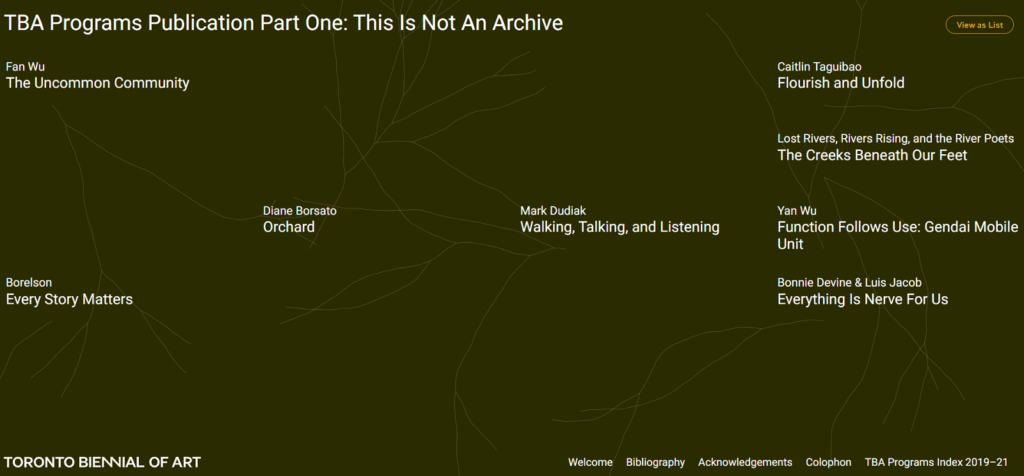
There is an echo in this title from the book that Butcher also edited when working on the documenta 14 aneducation program, which begins with the caveat:
This is not a book of good intentions
I re-echoed this phrase in the Forword to my own book, No Philosopher King, when I wrote (on my father’s birthday – January 7, 2020 – oblivious as to what would come with the COVID-19 pandemic and his death a few months later):
This is not a book of second chances
Furthermore, when artist, friend and OSU colleague Carmen Winant wrote a generous blurb for No Philosopher King, she also engaged with the ‘Minus’ theme as follows:
No Philosopher King is not a book. It takes the shape of one – words across sequential pages – but it is in fact something far less recognizable, far more fluid. Here is a project that is part illustrated cultural essay, part daybook, part art criticism, part classical discourse, part resistance manifesto. As if to say: extraordinary times need be met with experimental form. Minus Plato has retained the essence of its original life, as a blog: it is personal, it is shared, it is urgent, and we may move through it in any way we please. At its (wanting, radical) heart, this is a treatise on how we might consider contemporary art – during and after documenta 14 – as a flawed and powerful tool of dissent and responsibility in the age of Trump.
When thinking about how I wanted to introduce The Minus Plato Archive today, I considered writing about how this ‘Minus’ theme is a necessary gesture of refusal when confronted by the imperial, colonial and authoritarian control that archives represent and embody. I would have drawn a line through Jacques Derrida’s Archive Fever to Ariella Aïsha Azoulay’s Potential History: Unlearning Imperialism, with the former’s willingness to listen to ghosts and latter’s call for ‘The Commons; Not the Past’. Both of which, in different ways, inspired the second and final Minus Plato book Our Library of the Future: A Ghost’s Story (Share This: Press, 2022).
Yet instead I cannot think beyond today and how I see in my own ‘Minus’ is the violent erasure and negation desired by clamouring little big bullies, from those men in Ohio legislature, those men in my old department, to those men in academies, from Plato’s to Minimalism’s, that have created the fucked up mess that Twombly’s own Academy depicts.
Yet we need another image beyond the ‘Minus’ and the best way I can introduce The Minus Plato Archive today is to give you a glimpse of that image. If I were to start Minus Plato today, I would turn to cover of Ojibwe poet Heid E. Erdrich’s collection Little Big Bully that reproduces a detail from the print ‘Exit’ by fellow Ojibwe artist Andrea Carlson.
In the Cover Artist’s Note at the back of the book, Carlson describes how:
Exit is a print about absence and presence. A potential exit can represent a fear. Within Indigenous communities exists a deep-seated fear of losing cultural practices, languages, and art forms….The imagery within the print signifies conflicting directions and a state of exposure…Because prints are editioned and produced in multiple they have the ability to make a single image diasporic. This inherent quality of the print is my sigil for warding off loss.
As I sit here attempting to reflect on the 10 years of Minus Plato, with Carlson’s print reproduced on Erdrich’s book in mind, I am reminded of a different, though I’m sure somehow related, kind of fear and loss that is currently residing in three large plastic boxes in my basement: my library of Classics books. When I think about who The Minus Plato Archive is for, I think back to those students in the Ohio State Classics Department who were silenced and undermined, not only by the little big bullies from within, but also the structures they produce and maintain to keep them in their place. The Minus Plato Archive is an exit sign to anyone who wants to find a way out, whether it is from Classics or another system of control and oppression that parades itself as The Good. It can happen; it has happened, and it is here for you to add to your sabatage manual to make it happen for you.
Turning back to No Philosopher King, before it was published, I asked classicist Holly Granger to write a blurb for the book and even though it arrived too late to be added to the back cover, I want to reproduce it here as way to lead you into The Minus Plato Archive. But before I do, I want to thank everyone who has collaborated with me, engaged or read Minus Plato over the years, and especially to the artists who have inspired and transformed this project at every phase. Particular gratitude goes to my partner, Rebeka, and son, Eneko, who have lived through and with Minus Plato all these years.
Minus Plato is now The Minus Plato Archive, which will remain forever, unfinished.
- Richard Fletcher, May 4th, 2022, 10:30am
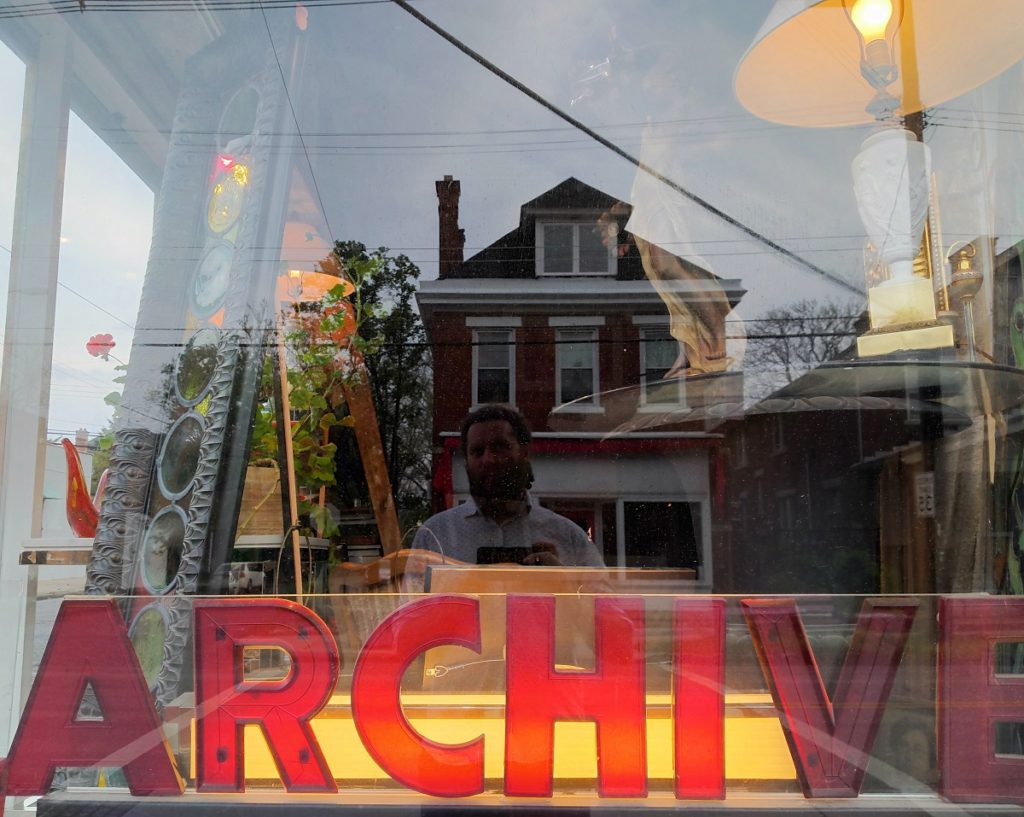
No Philosopher King is a vital critical-creative analysis of contemporary art and ‘the classical’ in a time of neo-fascism. The book unfolds through one scholar’s brutally honest account of the ways in which the violence and inequalities of the political present punctuated, infiltrated, and disrupted the personal and the scholarly — but it presents a firm reckoning for all classicists, revealing our complicity and ongoing participation in the methodological and ideological tenets of the discipline, despite our critique.
Rejecting the tendency in current studies of contemporary art and ‘the classical’ to cannibalise and instrumentalise artists’ use of the past to reify the ‘relevance’ of Classics, Minus Plato calls instead for a self-reflexive scholarship which cedes disciplinary authority and pays attention to the complexity of artists’ self-aware and ambivalent invocation of the classical.
No Philosopher King offers a vision of how contemporary art and scholarship – through communal dialogue and exchange – can make feminist and anti-racist interventions in ‘the classical’ and in the ‘now’ to improve the future. For at its heart is an optimistic message — about writing as resistance, and creativity as critical engagement. No Philosopher King is a challenging and stimulating hybrid artbook/ blogistori/ handbook/ guidebook/ breviary that invites an active participation in the collaborative and care-full form of resistance it calls for — a collaboration that begins by sending the reader off on their own journey to google the images, artists, blogposts, and manifestos that fill the book. You must change your life.
– Dr. Holly Ranger, Research Associate at the Institute of Classical Studies, UK.
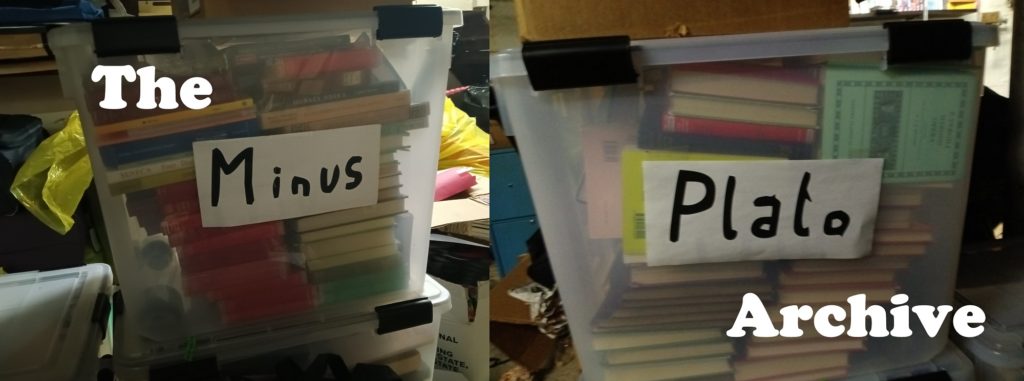
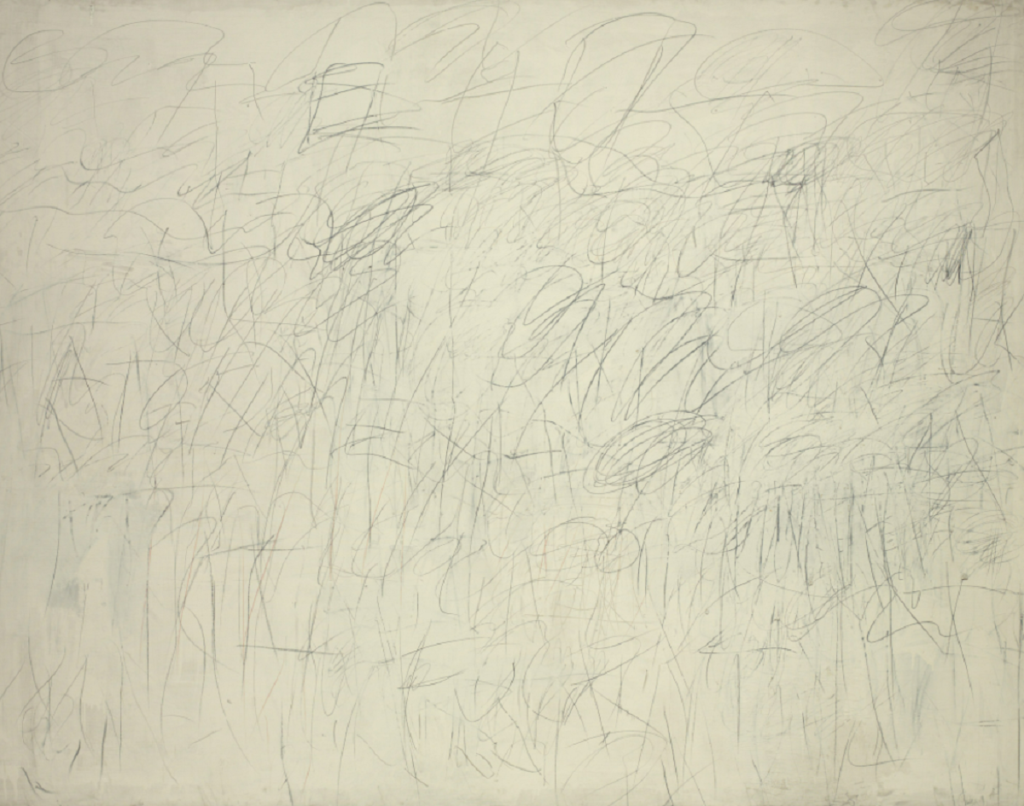
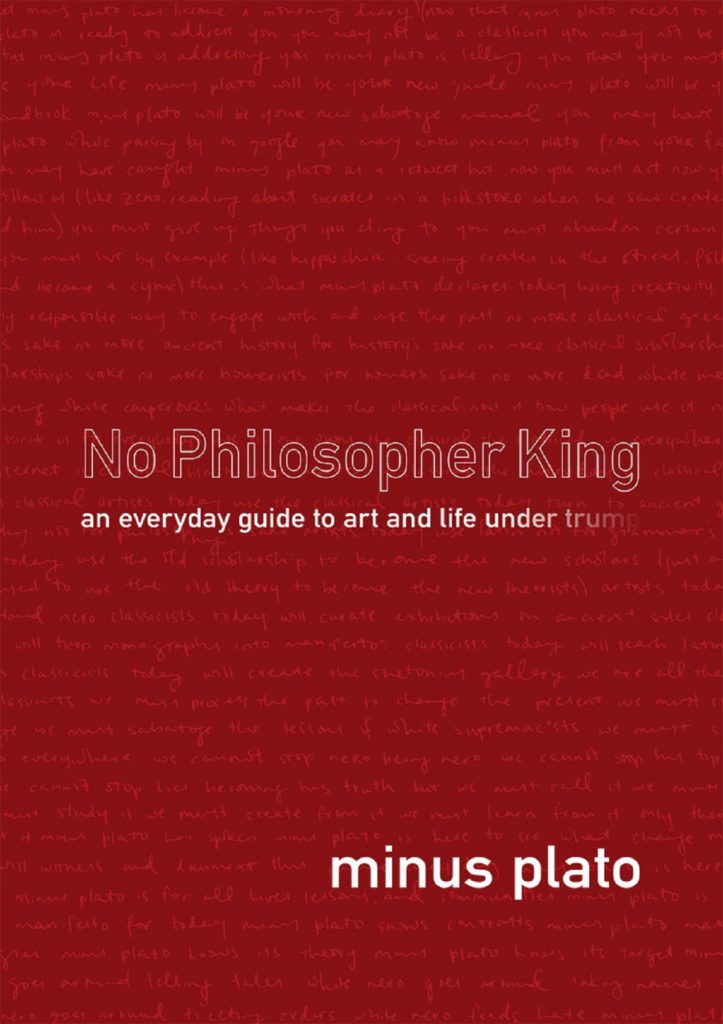
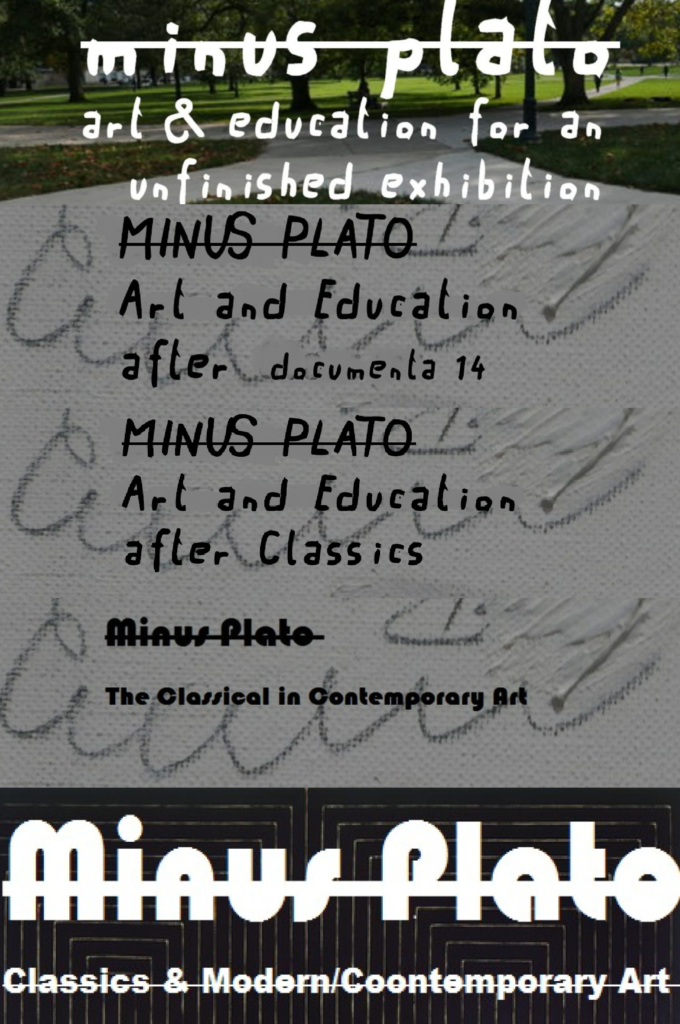
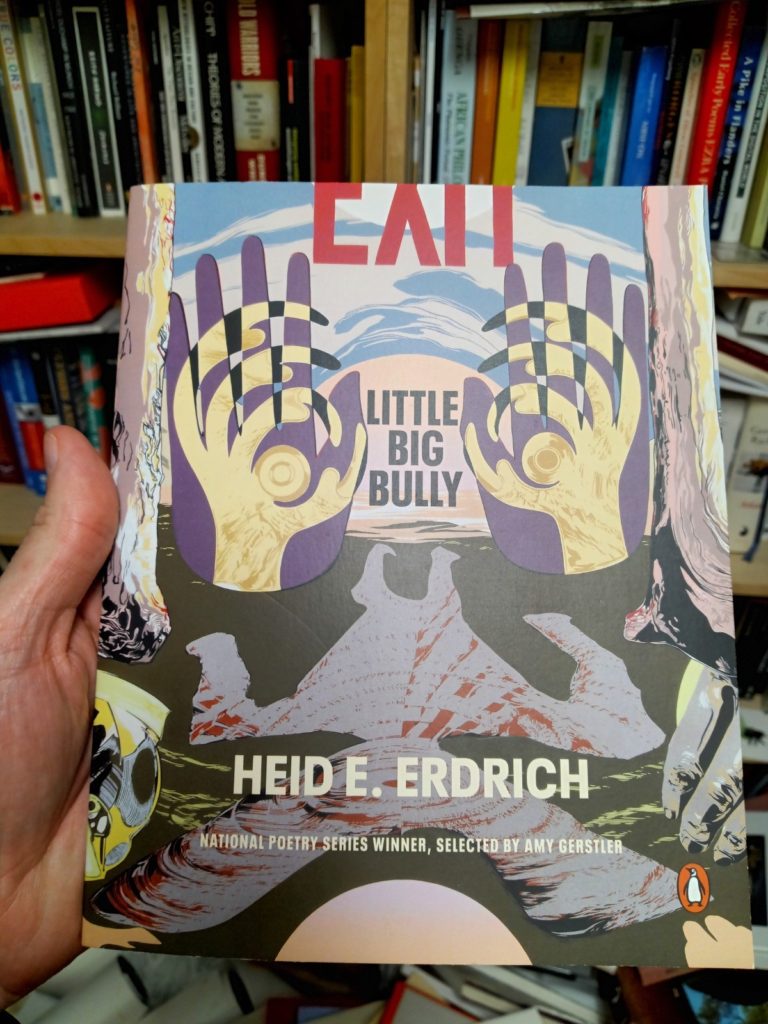
Richard,
lovely to meet you and engage in fascinating and refreshing conversation.
Would you send me your email address.
david